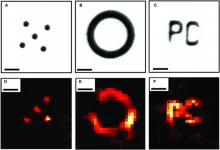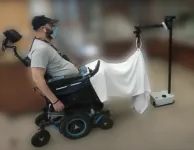(Press-News.org) Figuring out a lie has never been easier: forget body language or how convincing the message is, just listen to how detailed and rich the story is. This is the core of a new approach to lie detection, say researchers from the University of Amsterdam's Leugenlab (LieLab) in collaboration with researchers from Maastricht University and Tilburg University.
Since 9/11, security staff have been trained to recognise no less than 92 signals that someone might be lying. Bruno Verschuere, associate professor of Forensic Psychology: ‘This is nonsensical, because it’s an impossible task. People can't assess all those signals in a short time, let alone integrate multiple signals into an accurate and truthful judgment.’
We are used to believing people who look innocent. After all, it pays to believe by default that people are good. And liars have happily exploited this fact - just remember Lance Armstrong, he had many people’s sympathy for a long time’, says Verschuere.
Lie researchers have therefore been recommending for some time that it is best not to rely on someone's body language, but on what they actually say. Existing verbal lie tests try to combine numerous different signals, including consistency, directness and plausibility. However, these signals do not always point in the same direction.
The devil is in the details
The Lie Lab has now come up with a new approach to lie detection in which people base their judgments on just one signal. A simple rule of thumb which focuses entirely on the level of detail in the story told by the ‘liar’. It certainly takes a bit of getting used to.
‘It feels very counterintuitive to just listen to what people are saying and not to pay attention to all kinds of other signals, such as how convincingly or emotionally someone conveys their story,’ explains Verschuere. ‘But people who tell the truth can give a rich description because they actually experienced the event, whereas although liars can come up with details, this increases their risk of being caught.’
To illustrate the new approach to lie detection, Verschuere created a science comic together with cartoonist Jan Cleijne.
Unmasking liars
In order to know with 100% certainty whether someone was lying or not, the researchers conducted a series of lab experiments. A group of students was divided into guilty and innocent. Those assigned to the guilty group were instructed to steal an exam from a locker. Those in the innocent group were tasked with spending half an hour on the campus: go to the library, drink coffee and call a friend. Afterwards, both the innocent and guilty parties were to say that they had spent half an hour on campus. In nine studies, 1,445 people were asked to rate the accuracy of honest and deceptive handwritten statements, video transcripts, video interviews or live interviews.
Under the standard condition, participants were free to use all possible signals – from looking people in the eye to looking for nervous behaviour or a particularly emotional story – to assess whether someone was lying. In this situation, they found it difficult to distinguish lies from truths and scarcely performed above the level of probability. When instructed to rely only on the amount of detail (place, person, time, location) in the story, they were consistently able to discern lies from truths.
Student contributions
Bachelor's students from the UvA and Master's students from the UvA and the UM carried out data collection, control experiments and replication studies for the research in the context of their theses.
Learn more: https://go.nature.com/3mIJUir
Publication details
Bruno Verschuere, Chu-Chien Lin, Sara Huismann, Bennett Kleinberg, Marleen Willemse, Emily Chong Jia Mei, Thierry van Goor, Leonie H. S. Löwy, Obed Kwame Appiah, & Ewout Meijer: ‘The Use-the-best heuristic facilitates deception detection’, in: Nature Human Behavior (20 March 2023).
DOI: 10.1038/s41562-023-01556-2
Read the article: https://www.nature.com/articles/s41562-023-01556-2
Open Science
All materials, preregistrations, data and analysis scripts are publicly accessible at: https://osf.io/z26ar
END
LieLab: the devil is in the details
2023-03-20
ELSE PRESS RELEASES FROM THIS DATE:
Ultrafast beam-steering breakthrough at Sandia National Labs
2023-03-20
ALBUQUERQUE, N.M. — In a major breakthrough in the fields of nanophotonics and ultrafast optics, a Sandia National Laboratories research team has demonstrated the ability to dynamically steer light pulses from conventional, so-called incoherent light sources.
This ability to control light using a semiconductor device could allow low-power, relatively inexpensive sources like LEDs or flashlight bulbs to replace more powerful laser beams in new technologies such as holograms, remote sensing, self-driving cars and high-speed communication.
“What we’ve done is show that ...
Richards tracing racist violence through family networks of northern Louisiana
2023-03-20
Yevette Richards, Associate Professor, History and Art History, received funding to write a book about northern Louisiana.
The book will be a regional study of how kinship networks were central to the production of systemic racist terror and the subsequent erasure of its memory.
Richards will investigate a broad spectrum of racist violence from Reconstruction to the 1940s. She will show how white family networks functioned over time and across multiple parishes to serve as both incubators of racist violence and shields ...
Can lymph nodes boost the success of cancer immunotherapy?
2023-03-20
Media contacts:
Robin Marks, 628-399-0370
Robin.Marks@ucsf.edu | @UCSF
Julie Langelier, 415-734-5000
julie.langelier@gladstone.org | @GladstoneInst
New Data Show Therapies May Activate Lymph Nodes to Produce Tumor-Tackling T Cells
Cancer treatment routinely involves taking out lymph nodes near the tumor in case they contain metastatic cancer cells. But new findings from a clinical trial by researchers at UC San Francisco and Gladstone Institutes shows that immunotherapy can activate tumor-fighting T cells in nearby lymph nodes.
The ...
Emergence of extensively drug-resistant Shigella sonnei strain in France
2023-03-20
Shigellosis, a highly contagious diarrheal disease, is caused by Shigella bacteria circulating in industrializing countries but also in industrialized countries. Scientists from the French National Reference Center for Escherichia coli, Shigella and Salmonella at the Institut Pasteur who have been monitoring Shigella in France for several years have detected the emergence of extensively drug-resistant (XDR) strains of Shigella sonnei. Bacterial genome sequencing and case characteristics (with most cases being reported in male adults) suggest that these strains, which originated in South Asia, mainly spread among men who have sex with men (MSM). This observation needs to ...
Speckle-illumination proves useful in photoacoustic microscopy
2023-03-20
Motivated by the limitations of scanning approaches to photoacoustic microscopy, an international group supervised by Emmanuel Bossy of Université Grenoble Alpes experimented with structured illumination using known and unknown speckle patterns. One of their experiments produced the first demonstration of the use of blind structured illumination for photoacoustic imaging through a diffuser.
The group’s research was published Jan. 11 in Intelligent Computing, a Science Partner Journal.
The research article concludes that “photoacoustic microscopy can harness many of the structured illumination methods developed initially for pure optical ...
Carnegie Mellon researchers develop head-worn device to control mobile manipulators
2023-03-20
More than five million people in the United States live with some form of paralysis and may encounter difficulties completing everyday tasks, like grabbing a glass of water or putting on clothes. New research from Carnegie Mellon University's Robotics Institute (RI) aims to increase autonomy for individuals with such motor impairments by introducing a head-worn device that will help them control a mobile manipulator.
Teleoperated mobile manipulators can aid individuals in completing daily activities, but many existing technologies like hand-operated joysticks or web interfaces require a user to have substantial fine motor skills to effectively ...
Excess calories during development alters the brain and spurs adult overeating
2023-03-20
People whose mothers are overweight during pregnancy and nursing may become obese as adults because early overnutrition rewires developing brains to crave unhealthy food, according to a Rutgers study in Molecular Metabolism.
Rutgers researchers traced this link from mother to child in mice with an experiment that began by letting some mice get obese on unlimited high-fat food during pregnancy and breastfeeding while keeping others slim on limitless healthy food. They found that mice born to obese mothers stay slim in adulthood on unlimited healthy food but overeat more than mice born to lean mothers when given access to unhealthy food.
The ...
Federal-local immigration enforcement policies designed to reduce crime found to raise victimization among Latinos
2023-03-20
Efforts to understand the effects of immigration enforcement on crime have largely been informed by police crime statistics. In a new study, researchers used longitudinal data from the U.S. National Crime Victimization Survey (NCVS) to assess the impact of federal immigration policies on local communities. They found that activation of two policies—the Secure Communities Program and 287(g) task force agreements—significantly increased the risk of violent victimization among Latinos.
The study, by researchers at Penn State University and the University of Maryland (UMD) at College Park, ...
Developing postoperative delirium is associated with a faster rate of cognitive decline
2023-03-20
BOSTON, MA -- Research published today in the JAMA Internal Medicine finds that developing postoperative delirium is associated with a 40% faster rate of cognitive decline over those who do not develop delirium.
“Delirium is associated with faster cognitive decline,” said Zachary J. Kunicki, PhD, MS, MPH Assistant Professor located at the Warren Alpert Medical School of Brown University, the first author. “Whether delirium causes this faster rate of decline, or is simply a marker of those who are at risk of experiencing faster ...
Daily step counts before, after onset of COVID-19
2023-03-20
About The Study: The findings of this study suggest a consistent, widespread, and significant decline in activity following the onset of COVID-19 in the United States. Vulnerable populations, including individuals at a lower socioeconomic status and those reporting worse mental health in the early COVID-19 period, were at the highest risk of reduced activity. The researchers found a significant decline in daily step counts that persisted even after most COVID-19–related restrictions were relaxed, suggesting COVID-19 affected long-term behavioral choices. It is currently unknown whether this reduction is steps is clinically meaningful over time.
Authors: Evan L. ...





